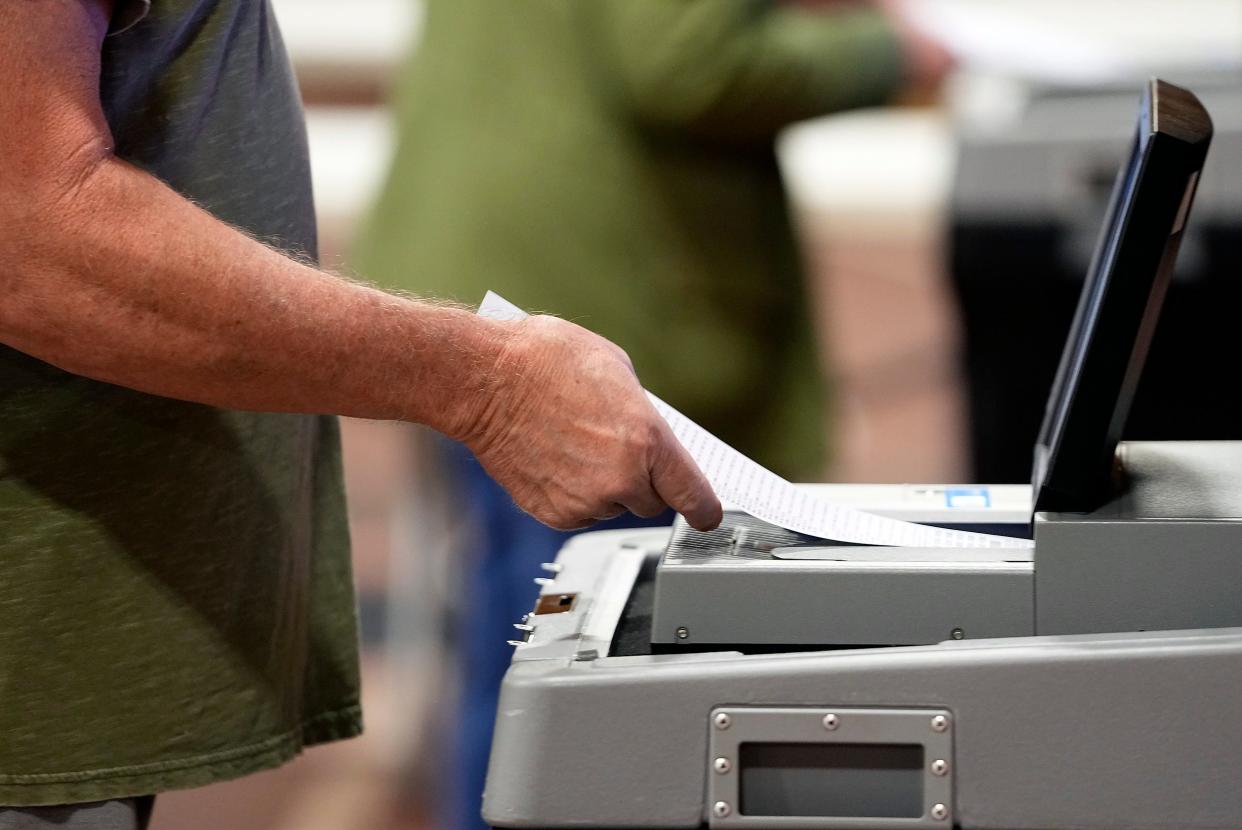Ohio Issue 2: What to know about the amendment on who can vote

Ohio voters will decide this fall whether noncitizens can vote in local elections.
State Issue 2, which would change the state constitution if a majority votes "yes", proposes that only adult U.S. citizens who legally reside and are registered to vote in Ohio for at least 30 days can cast a ballot in future state and local elections.
Backers of the amendment say it's important to uphold the integrity of citizenship, while opponents argue it's an unnecessary part of a trend to cut down on voting access.
A guide to voter rights in Ohio:What you need to know before you cast a ballot
Can noncitizens currently vote in Ohio?
The Ohio Constitution already states that "every citizen of the United States, of the age of eighteen years... and has been registered to vote for thirty days ... is entitled to vote at all elections." Federal law also prohibits noncitizens from voting in federal elections.
Ohio votes 2022:What is State Issue 1 on the ballot this fall?
But in 1917, the Ohio Supreme Court ruled that the state constitution's "home rule" – which gives cities the ultimate say over its own local affairs – allowed municipalities to expand voting rights in city elections. Back then, that meant a city could allow women to cast votes in local elections even though the right to vote was generally reserved for men.
What spurred this ballot issue was when the village of Yellow Springs in 2019 voted to allow noncitizens to cast ballots in local elections, but Ohio Secretary of State Frank LaRose ordered officials to table the measure. No noncitizens in Yellow Springs have registered to vote since then.
Election:US voting rights: Searchable state-by-state voters' rights; check your voter registration
State Issue 2 would make clear that a city's home rule does not override the requirement that only adult U.S. citizens can vote.
There have been a few instances where noncitizens allegedly registered to vote in Ohio, for which LaRose sent criminal referrals. Noncitizens who don't cancel their registration after a second notice can face felony charges.
Who's for State Issue 2?
The proposed constitutional amendment was put on the ballot by Republican lawmakers who say it's common sense that only citizens are allowed to vote, and therefore, any loopholes that could allow otherwise should be changed.
"This is about the integrity of our elections. We are being proactive to ensure our election laws are clear and unambiguous," said state Rep. Jay Edwards, R-Nelsonville, who sponsored the amendment alongside House Majority Leader Bill Seitz, R-Cincinnati.
LaRose has also expressed support and noted that letting noncitizens vote could create additional administrative burdens. He and others have pointed to how Democratic-controlled cities in other states, particularly New York City, have passed measures letting legal permanent residents vote locally.
"American elections are only for American citizens, and the cities in other states that have granted noncitizens the right to vote in local elections are undermining the value of what it means to be an American," LaRose previously said.
According to 2020 U.S. Census data, about 2% of Ohio residents are not U.S. citizens.
Who's pushing back?
Yellow Springs officials argue that there are legitimate reasons to let noncitizens vote in municipal elections, adding that its county board of elections is able to handle different ballots for noncitizens.
"These active and engaged community members pay taxes, own businesses, have children who attend ourschools; they are part of the fabric of communities," village council president Brian Housh told lawmakers. "Allowing these residents to vote on local issues enhances democracy by effectively providing a voice to those with a vested interest in their communities."
Opponents say language in the Ohio Constitution already addresses who can vote. The ballot issue is merely addressing a voter base who believes in unsubstantiated claims of widespread voter fraud, and it targets negative rhetoric at immigrant communities, said the Ohio Environmental Council Action Fund.
Ohio's next redistricting fight:Is it time to redraw Ohio's appeals court district lines? Some Republicans say yes
Democratic lawmakers are also urging a "no" vote on the amendment, calling it "unnecessary" and "cloaked in fear and false patriotism," wrote state Reps. Bishara Addison, Juanita O. Brent, Tavia Galonski and Michael Skindell.
They claim the amendment could restrict a 17-year-old Ohioan's right to vote in a primary if they turn 18 by the general election. LaRose disputed that, noting the amendment is not much different from current constitutional language.
National context
Noncitizen voters are not a new phenomenon. Many states have allowed noncitizens to vote in at least some elections at some point, according to historians, and the federal law outlawing noncitizen voting was enacted only in 1996.
In recent years, debate has intensified on both sides about letting noncitizens vote in some elections. Colorado, Florida and Alabama approved ballot measures in 2020 clarifying that only U.S. citizens can vote. On the other hand, multiple cities in Vermont, Maryland, Maine and other states have passed or are considering measures to let noncitizens vote in certain local elections.
Titus Wu is a reporter for the USA TODAY Network Ohio Bureau, which serves the Columbus Dispatch, Cincinnati Enquirer, Akron Beacon Journal and 18 other affiliated news organizations across Ohio.
Get more political analysis by listening to the Ohio Politics Explained podcast
This article originally appeared on The Columbus Dispatch: What is Ohio Issue 2 on the November 2022 ballot?

